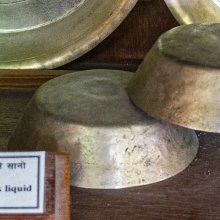Khalaka, Khaḷaka: 8 definitions
Introduction:
Khalaka means something in Hinduism, Sanskrit, the history of ancient India, Marathi. If you want to know the exact meaning, history, etymology or English translation of this term then check out the descriptions on this page. Add your comment or reference to a book if you want to contribute to this summary article.
The Sanskrit term Khaḷaka can be transliterated into English as Khalaka or Khaliaka, using the IAST transliteration scheme (?).
Images (photo gallery)
In Hinduism
Dhanurveda (science of warfare)
Source: Knowledge Traditions & Practices of India: Martial Arts Traditions: A SurveyKhalaka (खलक) refers to the “combat grounds”, related to the art of wrestling (mallayuddha), as defined in the 11th century Manasollāsa written by Someśvara III.—The ground for combat was known as khalaka; it was to be high, round, even and strong and surrounded by a vīkṣaṇamaṇḍapa (visitor’s gallery).

Dhanurveda (धनुर्वेद) refers to the “knowledge of warfare” and, as an upaveda, is associated with the Ṛgveda. It contains instructions on warfare, archery and ancient Indian martial arts, dating back to the 2nd-3rd millennium BCE.
Shaktism (Shakta philosophy)
Source: Google Books: ManthanabhairavatantramKhalaka (खलक) refers to a “threshing floor”, according to the Ṣaṭsāhasrasaṃhitā, an expansion of the Kubjikāmatatantra: the earliest popular and most authoritative Tantra of the Kubjikā cult.—Accordingly, “One should institute a great sacrifice at times of great fear, [...]. This (great sacrifice) brings every success and is the sure means of getting (whatever) one thinks about. I will tell (you) that clearly as it (truly) is. One should make a level canopy measuring sixteen (handspans) in a frightening forest, or (beside) a solitary tree or a single beautiful Liṅga, in a temple dedicated to the Mothers, on a battle ground, on a threshing floor [i.e., khalaka], in a house, or (places) that are tranquil, terrifying, or romantic as one pleases. Beautiful with flags and garlands, (it is erected) to (win) victory in battle with the enemy and for other purposes as they arise, each separately”.

Shakta (शाक्त, śākta) or Shaktism (śāktism) represents a tradition of Hinduism where the Goddess (Devi) is revered and worshipped. Shakta literature includes a range of scriptures, including various Agamas and Tantras, although its roots may be traced back to the Vedas.
India history and geography
Source: Cologne Digital Sanskrit Dictionaries: Indian Epigraphical GlossaryKhalaka.—(IA 18), a threshing floor [probably situated near a well]; cf. khala. Cf. khalaka-ante (LP), ‘at the end of the threshing season’. Note: khalaka is defined in the “Indian epigraphical glossary” as it can be found on ancient inscriptions commonly written in Sanskrit, Prakrit or Dravidian languages.

The history of India traces the identification of countries, villages, towns and other regions of India, as well as mythology, zoology, royal dynasties, rulers, tribes, local festivities and traditions and regional languages. Ancient India enjoyed religious freedom and encourages the path of Dharma, a concept common to Buddhism, Hinduism, and Jainism.
Languages of India and abroad
Marathi-English dictionary
Source: DDSA: The Molesworth Marathi and English Dictionarykhaḷaka (खळक).—m R A term of reviling for certain sauces when they are too dilute and sour; sour wishwash, rot gut.
--- OR ---
khaḷakā (खळका).—m Fragments of bāṅgaḍyā (glass-bangles), pitchers, dishes, bottles &c. 2 (Imit.) The clattering or loud rippling (of water). 3 fig. Brawling.
Marathi is an Indo-European language having over 70 million native speakers people in (predominantly) Maharashtra India. Marathi, like many other Indo-Aryan languages, evolved from early forms of Prakrit, which itself is a subset of Sanskrit, one of the most ancient languages of the world.
Sanskrit dictionary
Source: DDSA: The practical Sanskrit-English dictionaryKhalaka (खलक).—A pitcher.
Derivable forms: khalakaḥ (खलकः).
Source: Cologne Digital Sanskrit Dictionaries: Edgerton Buddhist Hybrid Sanskrit DictionaryKhalaka (खलक).—(1) m. or nt. (= Sanskrit khala), threshing-floor or granary: Kāraṇḍavvūha 28.18 (prose) mahā-khalake mahāntaṃ rāśiṃ kuryāt; (2) m. (= Sanskrit khala; AMg. khalaya, app. in this sense, [Ardha-Māgadhī Dictionary]), rogue, or adj. roguish, evil, bad: perhaps read khalakā(ḥ) for text khaṇḍakā(ḥ) (Ārya-)Mañjuśrīmūlakalpa 73.13; see s.v. khaṇḍaka.
[Sanskrit to German]
Sanskrit, also spelled संस्कृतम् (saṃskṛtam), is an ancient language of India commonly seen as the grandmother of the Indo-European language family (even English!). Closely allied with Prakrit and Pali, Sanskrit is more exhaustive in both grammar and terms and has the most extensive collection of literature in the world, greatly surpassing its sister-languages Greek and Latin.
See also (Relevant definitions)
Starts with: Khalakaduniya, Khalakala, Khalakalamka, Khalakana, Khalakapata, Khalakarana, Khalakarma, Khalakarmashtaka, Khalakarmoparjita.
Ends with: Akhalaka, Alakhalaka, Citramekhalaka, Kumbholukhalaka, Mekhalaka, Shrinkhalaka, Ucchrinkhalaka, Ulukhalaka.
Full-text: Kacchaka, Vikshanamandapa, Khandaka.
Relevant text
No search results for Khalaka, Khaḷaka, Khaḷakā, Khalakā; (plurals include: Khalakas, Khaḷakas, Khaḷakās, Khalakās) in any book or story.
